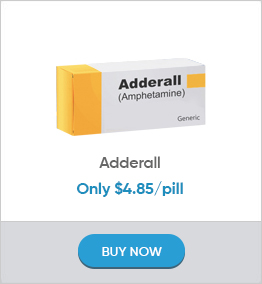Adderall is a prescription medication that combines amphetamine and dextroamphetamine, belonging to the stimulant class of drugs. It is ordinarily given to treat narcolepsy and attention deficit hyperactivity disorder (ADHD). Approved by the FDA in 1996, Adderall originated from a formulation called “Obetrol,” initially developed as a weight loss medication. However, its purpose shifted to treating ADHD, and it was rebranded as Adderall. As a brand-name medication, Adderall’s availability may vary by country. In the United States, it is commonly prescribed for ADHD and narcolepsy, with generic versions also available. It is accessible in immediate-release (IR) and extended-release (XR) forms.
How Adderall Operates
Adderall works by affecting certain chemicals in the brain and central nervous system, which helps to improve focus, attention, and impulse control in individuals with ADHD. The exact action mechanism of Adderall is not fully understood, but it is believed to involve the enhancement of neurotransmitter activity in the brain. Neurotransmitters are chemical messengers that facilitate communication between nerve cells (neurons). Two important neurotransmitters that are affected by Adderall are dopamine and norepinephrine.
- Dopamine: Adderall increases the release and inhibits the reuptake of dopamine. Dopamine is involved in the regulation of attention, reward, motivation, and pleasure. By increasing dopamine levels in the brain, Adderall helps to enhance focus, reduce distractibility, and promote a sense of motivation.
- Norepinephrine: Adderall also increases the release and inhibits the reuptake of norepinephrine. Norepinephrine is involved in the “fight-or-flight” response and plays a role in arousal, alertness, and attention. By increasing norepinephrine levels, Adderall can improve wakefulness, concentration, and overall cognitive performance.
The increased levels of dopamine and norepinephrine in the brain contribute to the therapeutic effects of Adderall in individuals with ADHD. These effects include increased attention span, reduced impulsivity, improved organization skills, and better academic or occupational performance.
Amplifying Productivity and Mental Clarity
Adderall is associated with the perception of amplifying productivity and mental clarity. Numerous studies have demonstrated the efficacy of Adderall and other stimulant medications in improving cognitive functioning and reducing symptoms in individuals with ADHD. These studies have shown that Adderall can enhance attention, focus, working memory, and impulse control in individuals diagnosed with ADHD.
Research on the use of stimulant medications for cognitive enhancement in healthy individuals is limited and less conclusive. However, some studies have examined the effects of stimulant medications on cognitive performance in healthy individuals in specific contexts. A study published in the journal Psychopharmacology investigated the effects of Adderall on healthy college students and found that it improved cognitive performance, including attention and working memory. However, the study also noted that these effects were more pronounced in individuals with lower baseline cognitive abilities. Another study published in the journal Neuropsychopharmacology examined the effects of stimulant medication on healthy participants performing complex cognitive tasks. The study found that the medication enhanced cognitive performance, particularly in situations that required sustained attention and cognitive control.
Adderall’s Compatibility with Other Drugs
Adderall can interfere with a number of other medications, so it is always advised to consult a doctor and be open about the drugs one is under before using Adderall. The blood levels of Adderall can be raised by acetazolamide, certain thiazides, and CYP2D6 inhibitors such as Benadryl, Wellbutrin, Paxil, Prozac, and Cymbalta which is to be avoided. MAOIs (monoamine oxidase inhibitors) reduce the metabolism of Adderall. Antihistamines, for example, may lose their calming effects when used with Adderall, reducing their efficacy. Lithium carbonate, haloperidol, and chlorpromazine can block Adderall’s stimulant effects. The duration of Adderall’s therapeutic efficacy may be impacted by proton pump inhibitors. Rapid breathing or more severe symptoms might result from an excess of acid in the body’s fluids. Metabolic acidosis can result from an amphetamine overdose.
Adderall Usage and Safety Profile
- Adderall is available in different strengths and formulations, and the dosage is individualized based on factors like age, weight, and the specific condition being treated. Administer Adderall precisely as directed by your doctor.
- Observe the dosage, frequency, and usage guidelines. Never alter the amount of your medication or stop taking it entirely without first consulting your doctor.
- As prescribed by your medical provider, take Adderall. It is often taken orally either with or without food. Pay attention to the precise dosage directions that were given to you.
- Combine the use of Adderall with healthy lifestyle practices. This includes getting regular exercise, maintaining a balanced diet, ensuring adequate sleep, managing stress, and practicing good self-care habits. These lifestyle factors can contribute to overall well-being and support the medication’s effectiveness.
- Maintain open communication with your healthcare professional throughout the treatment process. Discuss any changes in symptoms, concerns, or questions you may have. It’s important to report any side effects or unusual reactions promptly.
- Store Adderall in a safe place away from children or individuals who do not have a prescription for it. Do not share your medication with others, as it is prescribed specifically for your condition and needs.

